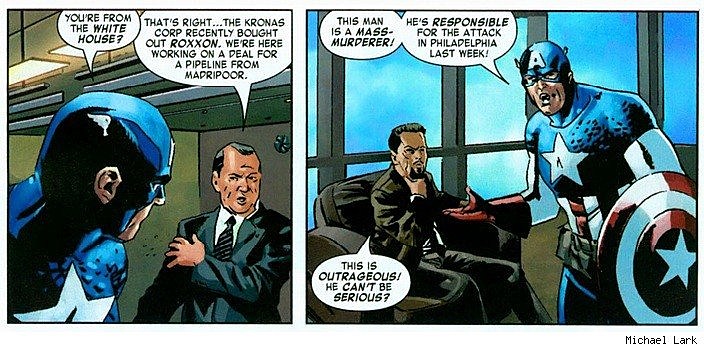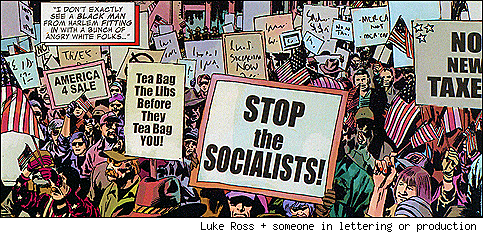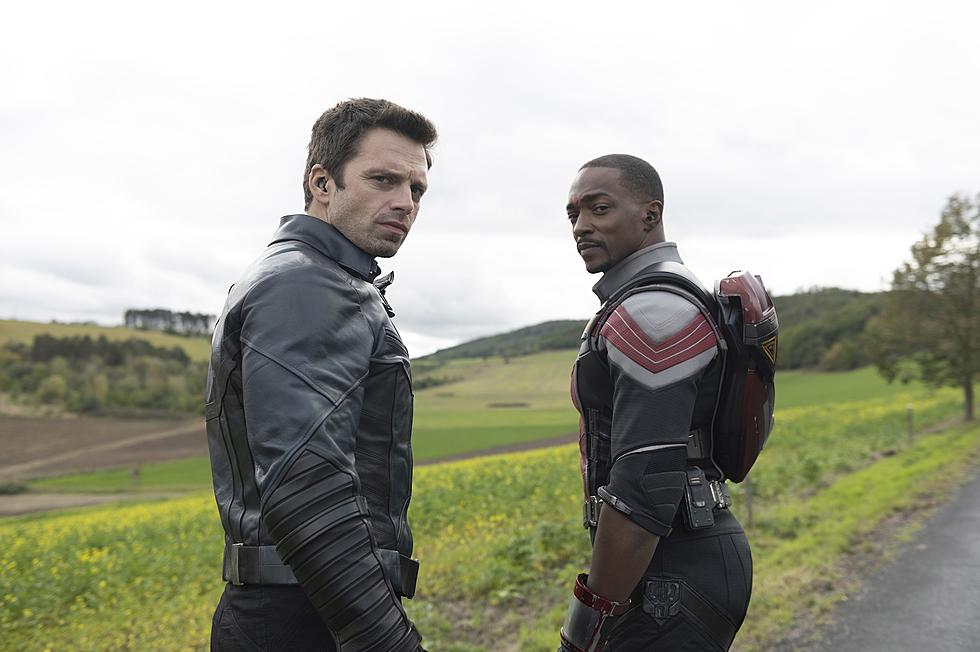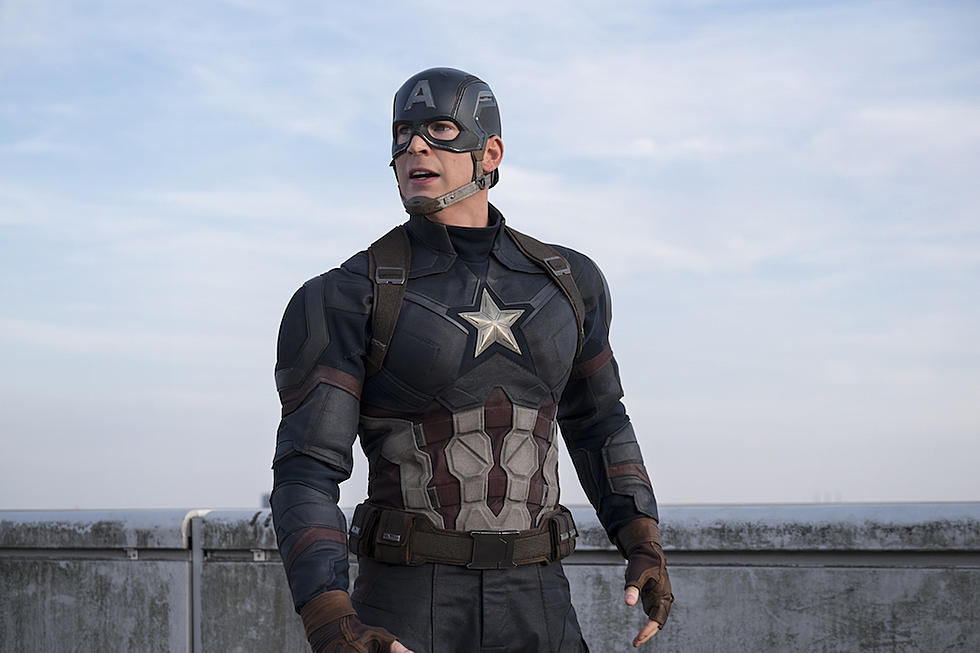
Ed Brubaker’s ‘Captain America': The Red Skull, Death Threats and Deregulation

With last week's Captain America #19, writer Ed Brubaker bid farewell to the title after eight explosive years. During his tenure, Brubaker brought Bucky back from the grave, killed Cap, traveled through time to bring him back from the grave, redefined the core concept for an entire generation, and earned the title a place as one of the most popular of its era. But beyond the huge events and never-ending series of shocking reveals lies Brubaker's real triumph. By capturing the conflict and uncertainty of America's war with itself for the last two presidential terms, the writer returned Captain America to his proper standing as the most politically relevant icon in pop fiction.
Ed Brubaker's first issue of the relaunched Captain America was published in January 2005 - the first month of George W. Bush's second term. His last issue hit the stands on October 24, only two weeks ahead of the 2012 elections. It almost seems intentional. During Brubaker's run, he had the unique opportunity to create high-octane, intelligent superhero espionage during the two most divisive and controversial presidential terms since, what -- ever? Though it has kind of been a slow, wallet-emptying, teeth-grinding, soul-crushing nightmare for many of us, Brubaker has consistently managed to mine our national indigestion for allegorical gold. Which is better than metaphorical silver, even with the exchange rate.
While resurrecting Bucky as the Winter Soldier and laying the groundwork for Cap's assassination, Brubaker was also exploring the America that Cap inhabited: embroiled in two wars, up to its neck in debt, and allowing private corporations to dictate all the rules. So pretty much the real world, but with superheroes. In the real world, the housing market came shuddering to a halt, millions in pensions and retirement funds disappeared, while the oil industry raked in record-breaking profits and titans of finance went begging for bailouts in private jets. In the comics, all of that happened pretty much the same way, but one of the greedy dicks taking advantage of rampant deregulation was the Red Skull.

Just before his apparent murder, the Red Skull embedded his psyche deeply in the mind of Aleksander Lukin, a former General in the Russian Army and CEO of Kronas Corporation. Starting with weapons sales, and with the help of the Cosmic Cube, Kronas grew to be one of the biggest corporations in the world. Kronas is a giant, multi-national conglomeration of smaller corporations, with stakes in housing, energy, and manufacturing. Even though Captain America and SHIELD are convinced Lukin is responsible for a bombing in Philadelphia (though unaware of Red Skull's role), because Kronas acquires Roxxon Oil and stands to make a lot of money for a lot of politicians, as Cap puts it, "he may as well have diplomatic immunity." Know what solves that? Roger Murtaugh and a gun.
Brubaker's plotting was masterful not only in its intricacy, but in its back-and-forth with reality, and the first three years of his tenure came to a crescendo in "The Man Who Bought America." Using Lukin's body and resources, Red Skull enacts a plan that takes years to unfurl, and only begins with the death of Steve Rogers. With Kronas, Skull tries to destroy America economically - by doubling oil prices, foreclosing on thousands of mortgages, and cutting thousands of jobs. He buys an American Senator and backs him for President as a member of "The Third Wing," an offshoot political party that blames everything on the government and wants even more deregulation.

Which is almost exactly what happened in real life. (Close enough anyway.) The Tea Party's real life super villain backers are Charles and David Koch, whose Koch Industries sold millions in oil equipment to Iran during a U.S. trade ban, and stole oil from Native American Reservations. Koch Industries are even rumored to have a history with the Nazi party. Actually, can we even be sure the Kochs didn't get the idea from Captain America? The conclusion to "The Man Who Bought America" had to have been written around early 2008, and the Tea Party was formed in early 2009, so Brubaker obviously wasn't making any comment about the Tea Party, he was just especially prescient. When he finally did make a comment about the anti-tax movement, not even the Tea Party in particular, it was of course the end of the world.
It's a story that's well-known by now, practically infamous. In Captain America #602, William Burnside, the insane, Commie-hunting Cap from the fifties is working with The Watchdogs, an extreme right-wing militia who hate just about everything not straight and white. In infiltrating the Watchdogs' hometown Boise, Idaho, Bucky and Sam Wilson come across an "anti-tax" rally where protesters carry signs that read "Stop the Socialists!," "America Not Americant," and "Tea Bag The Libs Before They Tea Bag YOU!" When Bucky suggests they infiltrate the group, Sam says "I don't exactly see a black man from Harlem fitting in with a bunch of angry white folks..." The end! Nothing happened after that, because it was a complete non-issue! Hah, no, of course not. That would be ridiculous.

What really happened is that conservative blogger Warner Todd Huston wrote a piece entitled "Marvel Comics: Captain America Says Tea Parties Are Dangerous and Racist." I'm not going to bother linking to it - you should already be able to guess how dumb it is. If not, here's a hint: it ends with the zinger "Nice going Marvel Comics. Thanks for making patriotic Americans into your newest super villians." Though anybody could easily see how the blogger blew things out of proportion just by reading the issue, somebody at Fox News picked it up and it somehow became a story. Brubaker has never been afraid to let it be known that he's left-leaning, but he pointed out that he had never designated the protesters as the Tea Party in the script, that the "Tea Bag The Libs Before They Tea Bag YOU!" sign had probably been added by somebody else, and he didn't think it was funny. Joe Quesada used Cup O' Joe to point out that it was specifically mentioned in Captain America #602 that the anti-tax protesters weren't affiliated with the Watchdogs, and that most of what Huston complained about came from a false premise. He apologized for the sign that implied the Tea Party, and Marvel have removed the text from all other editions. But apologies, explanations, and corrections weren't enough to stop death threats.
Captain America's life in fiction has been a tumultuous one. There are the scores of readers, retailers, and parents throughout the years who have hated that Captain America went after Adolf Hitler before America did, that he retroactively didn't hunt Communists, took on a black partner, implied Richard Nixon to be the leader of a terrorist organization, or refused to use September 11th as an excuse to kill brown people. And who could forget the racist uproar over Captain America: Truth?

You'd like to think it's not as bad today as it was in 1941, but it is. As Brubaker reminds us in his swan song, way back when, Captain America creators Joe Simon and Jack Kirby received death threats from American Nazis (for the record, I think Kirby could have taken them); as a result of the non-event in Captain America #602, Brubaker cancelled his public email account because of all the death threats he was receiving. Death threats. Do other characters elicit this kind of reaction? If The Punisher calls a group of right-wing extremists a bunch of fascists, does anyone bat an eyelash? Nope. If Captain America says the same, it's a talking point on Fox News, The Savage Nation, and other right-leaning organizations.
There must be a little extra pressure when working on Captain America. Must be. Any portrayal of the American public, government, and politics could be placed under such scrutiny, it could ruin your waking hours. Anytime a creator involves politics in Captain America, any time a stance is taken - whether it's Cap's or the creator's - somebody somewhere is going to be offended. By deciding what Captain America is supposed to stand for, a lot of readers think the creator is deciding what America should stand for. Only Ed Brubabker can say if he was proselytizing, but he was never afraid to make clear what he believed Captain America would stand for. Think of that as the good thing you can take away from eight years of a broke, maniacally confused, and startlingly racist "post-racial America": it made for awesome stories.
More From ComicsAlliance









